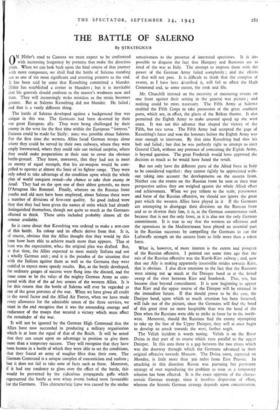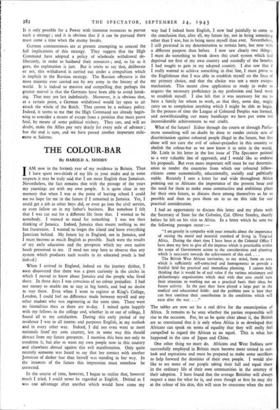THE BATTLE OF SALERNO
By STRATEGICUS
ON Hitler's road to Canossa we must expect to be confronted with increasing frequency by portents that make the direction plain. When we can look back upon the final course of that journey
with more composure, we shall find the battle of Salerno standing out as one of the most significant and arresting pointers to the end.
It has been said by some that Kesselring committed a blunder.
Hitler has established a corner in blunders ; but it is inevitable that his generals should conform to the master's weakness now and then. They will increasingly make mistakes as the strain becomes greater. But at Salerno Kesselring did not blunder. He failed ; and that is a vastly different thing.
The battle of Salerno developed against a background that was unique in this war. The Germans had been deserted by their one great European ally. They were being challenged by their enemy in the west for the first time within the European " fortress." Excuses could be made for Sicily: none was possible about Salerno. For the first time the western Allies faced German troops alone where they could be served by their own railways, where they were amply forewarned, where they could rule out tactical surprise, where they could make preparations at their ease to cover the obvious battle-ground. They knew, moreover, that they had not to meet an enemy of equal strength, that his air-weapon would be com- pelled to operate at almost the limit of its fighter range. They were only asked to take advantage of the condition upon which the whole plan of world conquest rested—the chance to take their enemy in detail. They had on the spot one of their ablest generals, no mere D'Artagnan like Rommel. Finally, whereas on the Russian front youths and old men have been employed, about Salerno there were a number of divisions of first-rate quality. So good indeed were they that they had been given the names of units which had already distinguished themselves, though not quite so much as the Germans affected to think. These units included probably almost all the armour available.
So it came about that Kesselring was ordered to make a test-case of this battle. Its colour and its effects derive from that. It is, of course,, obvious that the Allies thought that they would by this time have been able to achieve much more than appears. That at least was the expectation, when the original plan was drafted. But, at that time, the Allies expected to meet mainly Italians and not a wholly German unit ; and it is the paradox of the situation that with the Italians against them as well as the Germans they were entitled to expect more speedy results. But, as the battle developed, the ordinary gauges of success were flung into the discard, and the issue came to be the value of the mighty German Army as com- pared with that of the ad hoc armies of the western Allies. It is for this reason that the battle of Salerno will ever be regarded as one of the great portents of the war. When we have given all credit to the naval factor and the Allied Air Forces, when we have made every allowance for the admirable union of the three services, we must in the end recognise that it was the astounding courage and endurance of the troops that secured a victory which must affect the remainder of the war.
It will not be ignored by the German High Command that the Allies have now succeeded in producing a military organisation which is at least the equal of that of the Reich. It will be noted that they can count upon no advantage in position to give them more than a temporary success. They will recognise that they have been beaten in a battle of which they were able to set the conditions, that they found an army of tougher fibre than their own. The German Command is a unique complex of romanticism and realism ; but it does not fail to take note of facts such as these. Moreover, if it had any tendency to gloss over the effect of the battle, this would be prevented by the ridiculous propaganda gaffe which represented the battle as won when events looked most favourable for the Germans. This characteristic lapse was caused by the undue
sensitiveness to the presence of interested spectators. It is im- possible to disguise the fact that Hungary and Rumania are as tired of the war as Italy. The attempt to impress them with the power of the German Army failed completely ; and the effects of that will not pass. It is difficult to think that the complex of events, as. I have here described it, will- fail to affect the High Command .and, to some extent, the rank and file.
Mr. Churchill insisted on the necessity of measuring events on one front against their setting in the general war picture ; and nothing could be mom necessary. The Fifth Army at Salerna enabled the Fifth Corps to take possession of the great southern ports, which are, in effect, the glacis of the Balkan theatre. It also permitted the Eighth Army to make unusual speed up -the west coast. It was not this advance that shaped the victory of the Fifth, but vice versa. The Fifth Army had accepted the gage of Kesselring's force and won the honours before the Eighth Army was near enough to intervene. By that time Kesselring had shot his bolt and failed ; but that he was perfectly right to attempt to eject General Clark, without any pretence of containing the Eighth Army, is beyond question. The great Frederick would have approved the decision as much as he would have hated the result.
But not only have the different parts of the Allied force in Italy to be considered together : they cannot rightly be appreciated with- out taking into account the developments on the eastern front. Neither can the events on the Russian front be seen in their true perspective unless they are weighed against the whole Allied effort and achievement. When we pay tribute to the scale, persistence and force of the Russian offensive, we should not ignore the great part which the western Allies have played in it. If the Germans are attempting to disengage their divisions on the Russian front and so to shorten their line, it is, as the German commentator said, because that is not the only front, as it is also not the only German commitment. It is true to say that the western air offensive and the operations in the Mediterranean have played an essential part in the Russian successes by compelling the Germans to cut the Luftwaffe strength on the eastern' front to little more than a token force.
What is, however, of more interest is the extent and prospect of the Russian offensive. I pointed out some time ago that the axis of the Russian offensive was the Kursk-Kiev railway ; and, now that our Ally is making apparently irresistible strides towards Kiev, that is obvious. I also drew attention to the fact that the Russians were aiming not ap much at the Dnieper bend as at the broad sweep of the river between Kiev and Smolensk. This, too, has become clear beyond concealment. It is now beginning to appear that Kiev and the upper course of the Dnieper will be attained in the immediate future. If that should prove to be the case, the Dneiper bend, upon which so much attention has been focussed, will fade out of the picture, since the Germans will find the bend of this great river no more hospitable than was the bend of the Don when the Russians were able to strike in force far to the north- west. Moreover, should the Russians find the enemy attempting to take up the line of the Upper Dnieper, they will at once begin to develop an attack towards the west, farther north.
The Velizh incident is worth noting. Velizh is on the River Dvina in that part of its course which runs parallel to the upper Dnieper. In this area there is a gap between the two rivers which was the doorway through which the Germans advanced in their original offensive towards Moscow. The Dvina town, captured on Monday, is little more than 30o miles from East Prussia. In attacking in this direction Russia was pursuing her persistent strategy of ever reproducing the problem as soon as a temporary solution has been effected. It is the exact opposite of the charac- - teristic German strategy, since it involves dispersion of effort, whereas the historic German strategy depends upon concentration. It is only possible for a Power with immense resources to pursue such a strategy ; and it is obvious that if it can be pursued there must come a time when the enemy breaks.
German commentators are at present attempting to conceal the full implications of this strategy. They suggest that the High Command have adopted a policy of wholesale withdrawal de- liberately, in order to husband their resources ; and, so far as it goes, the explanation is just. But it omits to say that, deliberate or not, this withdrawal is carried out under a compulsion which is implicit in the Russian strategy. The Russian offensive is the most majestic ever carried out by any army in the history of the world. It is indeed so massive and compelling., that perhaps the greater marvel is that the Germans have been able to avoid break- ing. That may not last indefinitely. Moreover, it is obvious that, at a certain point, a German withdrawal would lay .open to air attack the whole of the Reich. That cannot be a military policy. Indeed, it seems to me that the High Command are already begin- ning to consider a means of escape from a position that must prove fatal, by means of some political trickery. They can, and will no doubt, make the Allies pay very dearly fcr every mile of advance ; but the end is sure, and we have passed another important mile- stone at Salerno.



























 Previous page
Previous page